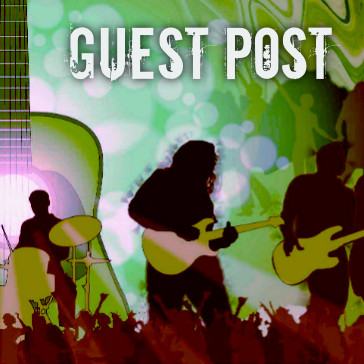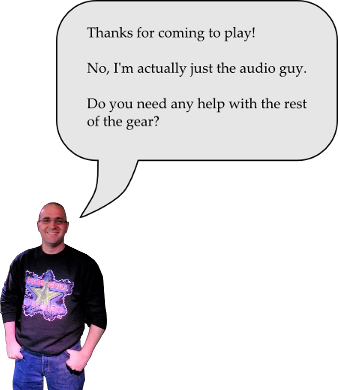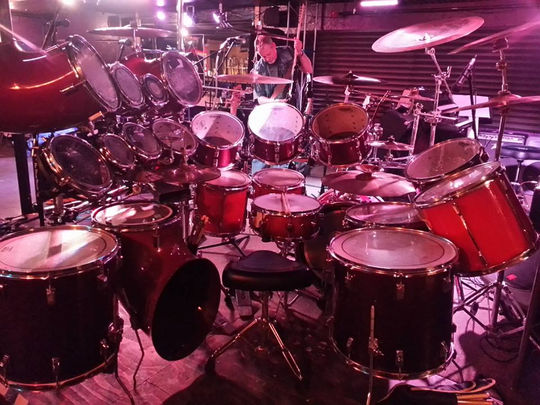If you were listening to rock radio in the late 80s and early 90s, you almost certainly heard “Holy Diver” by Dio. (I personally prefer “Rainbow In The Dark,” but what can you do?) “Holy Diver” has a line that – probably unintentionally – sums up the music business:
“Between the velvet lies/ There’s a truth as hard as steel”
There are a LOT of “velvet lies” in the industry.
“It’s one huge party, all day and all night!”
Actually, it’s a lot of work and heartache.
“It’s a sea of money!”
Actually, it’s more like a black hole that eats money. And time. Also souls, in some cases. A dark, howling vortex of – yeah, you get the idea.
“Everybody will love you!”
Actually, a lot of people will hate you, talk trash, snipe at every little thing you do and say, and be filled with vicious envy for any success that you have. Also, the hate grows proportionally to your level of success. Don’t forget to smile!
I could go on.
The point is that there’s the popular portrayal, and then there’s the real thing.
The “velvet lies” don’t just apply for the surface elements, though. The deep, critical concepts of music as a career are just as subject to falsehood. In fact, these falsehoods that touch “the innermost workings” are the most entrenched lies and half truths you’ll find in the biz.
You know why they’re so profoundly embedded? It’s because they’re the lies that we, as music industry people, tell ourselves and each other. Over and over. For years.
One of the biggest ones has to do with getting paid – or, more correctly, WHY musicians get paid.
The Velvet Lie: Bands are paid to play music.
The Truth As Hard As Steel: Some bands are paid to play music. Most bands are paid to bring a crowd.
I understand that what I just said is uncomfortable. It may even have made you steaming mad. Before you run off, though, please hear me out. This isn’t a judgmental thing at all. Heck, I’ve believed this lie myself. What I think, though, is that once we’re over the initial sting of the truth, ceasing to lie to ourselves actually makes us a lot happier.
Here’s what I’ve come to believe.
History
Decades ago, music clubs were media outlets. Before the Internet was a household appliance, before there were a million TV channels, and before consumer video playback, high-value entertainment (that wasn’t TV) meant going to a physical place. If you wanted to hear new music, that meant going to a record store or going to a bar/ club/ theater/ whatever. If you just plain wanted to be social, that meant going to a bar or club.
As such, the music venues had something of a captive audience.
Actually, it was only the good venues. I’m convinced that there were a bunch of craptastic music clubs back in the 60s, 70s, and 80s, and they’ve just been forgotten or glossed over.
Anyway.
People went out to the clubs and bars because they wanted to be entertained in a way that they couldn’t be at home. The venue drew the crowd, and then paid bands to play music that entertained that crowd.
Yes – that’s correct. In that situation, the band WAS paid to play music. The bands that kept people happy and dancing, and that helped build the club’s reputation were booked more often and paid more coin. As far as I can tell, this is when the basic bar and club pay scales were formed.
What was also formed was the idea that bands in bars and clubs were paid to play music. At the time, this idea was true – or at least, true more often.
Now, though, fewer bars and clubs have a “capacity” captive audience. Just about every place has some regulars, but the “salad days” of your local venue being a media outlet are over. Still, there are situations where musicians are paid as providers of music. These situations are easy to identify. They occur…
…When Somebody Else Brings The Audience
If you want to boil this down to a universally applicable rule, this is about as close as I think you can get:
Musicians are paid as players of music when an event’s audience will be present for reasons independent of the music.
Okay. What does that mean?
Weddings. Birthday parties. Corporate events. Fashion shows. Festivals and conventions. Fireworks displays.
In all of these cases, the crowd’s primary interest is in something other than the provided music. Sure, the music may be an added sweetener – maybe even a very strong one – but the main purpose is something else. The event planner selects and books acts that they feel the event attendees will enjoy. Indeed, they may even choose an act that they hope will tip a “maybe” attendee towards being a “definite.” Even so, if there were no band there would still be an event. The implication, then, is another rule of thumb:
When the music provided is a secondary part of an event’s “draw,” a musician can rightly consider themselves a contractor who is entitled to guaranteed pay per hour or per appearance.
There are some music venues that CAN operate via this model. However, to the best of my knowledge they are a relative rarity. If you’re a musician who intends to play mostly in bars and clubs, then the assumption you should make is…
…YOU Are Expected To Bring The Audience
In these days of “superabundant” media, bars and clubs just aren’t THE destination anymore. To fight against this, bars and clubs bring in attractions.
The point of an attraction is that it attracts people. (Also, the first rule of Tautology Club is the first rule of Tautology Club.) If an attraction fails to bring patrons to the bar, club, or all-ages room, then it’s not much good as an attraction. That’s pretty obvious.
The thing is, though, that this change in the bar and club entertainment model was never explicitly communicated to the musicians. Heck, it was never explicitly communicated to the venue operators. I’ve been a venue operator, and I’ll tell you that a lot of things I did were essentially instinctual. It wasn’t until after the fact that I stopped to think about why things were the way they were.
So, anyway, the the no-longer-true idea that musicians in bars and clubs are paid to be musicians has hung around, caused misunderstandings, started fights, broken up friendships, and just generally made people unhappy. The “velvet lie” is so uncomfortable because it causes a mismatch between expectation and reality – the musician expects payment commensurate with their work as a musician, and the venue expects to pay in a manner commensurate with the act’s draw.
To avoid expectation mismatch with reality, I would thus propose the following:
When the music provided is the primary factor in an event’s “draw,” a musician can expect their pay to be proportionally scaled to their ability to attract attendees to a particular place.
Okay. Now you’re pissed at me, right?
Let me be clear.
I long for – THIRST for – a world where art has intrinsic value. I’ve made music myself. I make visual art myself. I believe that an artist’s time is valuable. I wish, and wish desperately, that any artistic work could be converted to a predictable amount of currency (or other buying power) at will. I hunger for a reality where the intrinsic value of human life is tangible at all times.
If I could build a venue where anyone could get booked, and everybody who was booked made enough money to live in luxury until they were booked again, I would do so without hesitation.
Unfortunately, all of us are stuck with the reality we have until that reality changes.
So, what can we do?
The main step is to stop cuddling up with velvet lies. For most of us, the hard truth is that the value of a musical act is based upon attractional power. This is a tough pill to swallow for folks in the small-venue world, but once the pill goes down it gets a bit easier to manage.
Another bit of salve for the sting is that, at the highest levels of success and stardom, value based on power as an attraction is still the norm. Huge artists that get paid a flat rate from, say, Live Nation, are paid that guarantee because their proven draw is enormous. The risk to the promoter is relatively small in a situation like that, especially if the promoter has a lot of other big-name acts on the roster. Fundamentally, this is exactly the same at all show scales. This brings me to a closing thought for this article:
When the music is the main attraction, a musician’s pay is based solely upon the tangible value brought to the venue, minus the overall risk that a payout presents to the operator.
That’s the reality of the small-venue world. It isn’t velvet-soft, but it is the truth.


 The big, red note is what musicians think they’re getting paid for. Actually, most musical acts are paid for their ability to bring out the people in the foreground.
The big, red note is what musicians think they’re getting paid for. Actually, most musical acts are paid for their ability to bring out the people in the foreground.
 That picture up there is Jason Giron’s “Extra Extra Large” drumkit. He, along with the rest of The Floyd Show, are a great example of “acting like rockstars the right way.”
That picture up there is Jason Giron’s “Extra Extra Large” drumkit. He, along with the rest of The Floyd Show, are a great example of “acting like rockstars the right way.”